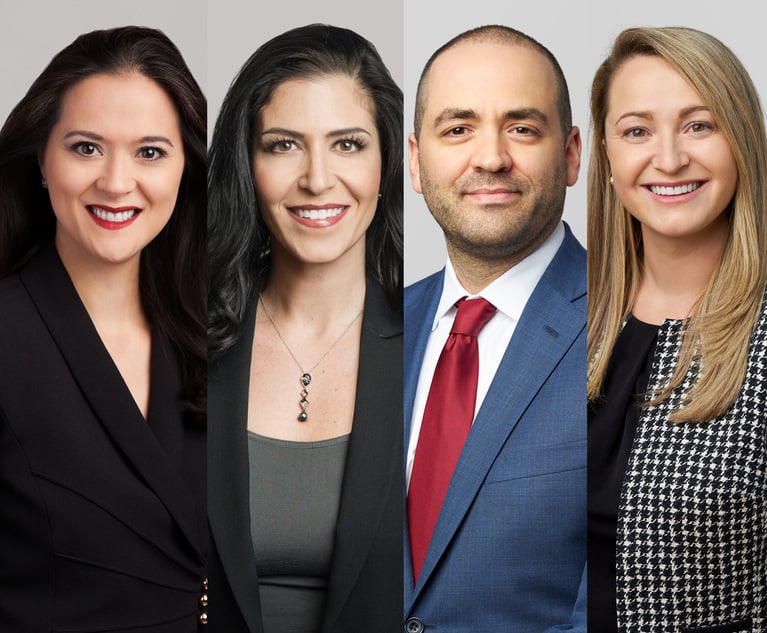Stop the Criminalization of Politics, Bridgegate's Kelly and Baroni Ask Supreme Court
Kelly and Baroni asserted in their Supreme Court briefs that the court should reject the prosecution's theory that mischaracterizing the reason for the lane realignments helped them facilitate fraud against the Port Authority.
September 17, 2019 at 06:31 PM
4 minute read
 William Baroni, former deputy executive director of the Port Authority of New York & New Jersey, left, and Bridget Anne Kelly, former deputy chief of staff for New Jersey Gov. Chris Christie, exit the federal courthouse in Newark, New Jersey, on Nov. 2, 2016. Photo: Peter Foley/Bloomberg
William Baroni, former deputy executive director of the Port Authority of New York & New Jersey, left, and Bridget Anne Kelly, former deputy chief of staff for New Jersey Gov. Chris Christie, exit the federal courthouse in Newark, New Jersey, on Nov. 2, 2016. Photo: Peter Foley/Bloomberg
The politically motivated lane realignment scheme on the George Washington Bridge, planned for the purpose of generating gridlock in the town of Fort Lee, was not sufficient grounds to convict them of defrauding the government, Bridgegate defendants Bridget Anne Kelly and William Baroni Jr. argued in briefs filed Tuesday at the U.S. Supreme Court.
Kelly and Baroni are asking the justices to reject the theory of their 2016 convictions, which is that they committed fraud by realigning access lanes to the bridge to extract political retribution on Fort Lee's mayor for failing to endorse Gov. Chris Christie's reelection campaign, while falsely claiming that the changes were made under the auspices of a traffic study.
Kelly, a former deputy chief of staff to Christie, and Baroni, a deputy director of the Port Authority of New York and New Jersey, asserted in their Supreme Court briefs that the court should reject the prosecution's theory that mischaracterizing the reason for the lane realignments helped them facilitate fraud against the Port Authority. As Kelly and Baroni describe the prosecution's view of the case, the traffic study guise allowed other Port Authority employees to carry out the scheme without being overruled by supervisors who might object to the underlying political motives. But they warn the government's theory, if allowed to stand, could have grave implications.
"It would readily allow the indictment and prosecution of nearly any public official in the nation. And it would effectively unwind 30 years of this court's jurisprudence reining in the far-flung honest-services fraud theories that prosecutors have invoked to enforce their preferred visions of good government. These consequences, both practical and doctrinal, and none of which the Third Circuit denied, make it abundantly clear that the decision below is wrong," said Kelly's brief, filed by Yaakov Roth of Jones Day in Washington.
"Some may find politically motivated decisions like these to be unappealing aspects of local politics, but no one would deny that they are aspects of local politics," according to the brief from Baroni, whose counsel of record is Michael Levy of Sidley Austin in New York. "And they have never before been deemed criminal. If the court endorses the government's theory, any public official who is not indicted when he or she engages in such activity will have to thank the grace of prosecutorial discretion."
Kelly and Baroni were each convicted in connection with the lane closures. Baroni was initially sentenced to 24 months in prison and Kelly drew 18 months, but after the U.S. Court of Appeals for the Third Circuit vacated two counts for each of the defendants in November 2018, their sentences were reduced to 18 months for Baroni and 13 months for Kelly.
Kelly appealed to the Supreme Court after the Third Circuit issued its ruling. The Supreme Court agreed to hear the case in July. Baroni said in Tuesday's filing that he did not join Kelly in seeking certiorari at that time because he opted instead to begin serving his sentence while deciding to seek further review of the conviction. Later, he was concerned that filing for certiorari would delay Kelly's petition, so he opted to seek review of the Third Circuit decision by filing as a respondent, as provided for in the court's rules.
Both Kelly and Baroni argued in briefs that their convictions go against the Supreme Court's past rulings on honest services fraud.
"The convictions here stem from the government's attempt to work around those decisions and prosecute the same conduct using the novel theory that a public official who offers an insincere justification for an official decision in order to conceal a political motive causes the deprivation of the public money or property expended in connection with that decision," Baroni's brief to the Supreme Court states. "Because every official decision requires the expenditure of at least some money or property, the government's theory would nullify McNally and Skilling, subjecting state and local officials to the same federal code of good government that this court has disallowed. For that reason, the convictions should be reversed."
This content has been archived. It is available through our partners, LexisNexis® and Bloomberg Law.
To view this content, please continue to their sites.
Not a Lexis Subscriber?
Subscribe Now
Not a Bloomberg Law Subscriber?
Subscribe Now
NOT FOR REPRINT
© 2025 ALM Global, LLC, All Rights Reserved. Request academic re-use from www.copyright.com. All other uses, submit a request to [email protected]. For more information visit Asset & Logo Licensing.
You Might Like
View All
On the Move and After Hours: Einhorn Barbarito; Gibbons; Greenbaum Rowe; Pro Bono Partnership
4 minute read

Engine Manufacturer Escapes Suit Over NJ Helicopter Crash That Killed Country Music Star
3 minute readTrending Stories
- 1Eliminating Judicial Exceptions: The Promise of the Patent Eligibility Restoration Act
- 2AI in Legal: Disruptive Potential and Practical Realities
- 3One Court’s Opinion on Successfully Bankruptcy Proofing a Borrower
- 4Making the Case for Workflow Automation
- 5Copyright Infringement by Generative AI Tools Under US and UK Law: Common Threads and Contrasting Approaches
Who Got The Work
J. Brugh Lower of Gibbons has entered an appearance for industrial equipment supplier Devco Corporation in a pending trademark infringement lawsuit. The suit, accusing the defendant of selling knock-off Graco products, was filed Dec. 18 in New Jersey District Court by Rivkin Radler on behalf of Graco Inc. and Graco Minnesota. The case, assigned to U.S. District Judge Zahid N. Quraishi, is 3:24-cv-11294, Graco Inc. et al v. Devco Corporation.
Who Got The Work
Rebecca Maller-Stein and Kent A. Yalowitz of Arnold & Porter Kaye Scholer have entered their appearances for Hanaco Venture Capital and its executives, Lior Prosor and David Frankel, in a pending securities lawsuit. The action, filed on Dec. 24 in New York Southern District Court by Zell, Aron & Co. on behalf of Goldeneye Advisors, accuses the defendants of negligently and fraudulently managing the plaintiff's $1 million investment. The case, assigned to U.S. District Judge Vernon S. Broderick, is 1:24-cv-09918, Goldeneye Advisors, LLC v. Hanaco Venture Capital, Ltd. et al.
Who Got The Work
Attorneys from A&O Shearman has stepped in as defense counsel for Toronto-Dominion Bank and other defendants in a pending securities class action. The suit, filed Dec. 11 in New York Southern District Court by Bleichmar Fonti & Auld, accuses the defendants of concealing the bank's 'pervasive' deficiencies in regards to its compliance with the Bank Secrecy Act and the quality of its anti-money laundering controls. The case, assigned to U.S. District Judge Arun Subramanian, is 1:24-cv-09445, Gonzalez v. The Toronto-Dominion Bank et al.
Who Got The Work
Crown Castle International, a Pennsylvania company providing shared communications infrastructure, has turned to Luke D. Wolf of Gordon Rees Scully Mansukhani to fend off a pending breach-of-contract lawsuit. The court action, filed Nov. 25 in Michigan Eastern District Court by Hooper Hathaway PC on behalf of The Town Residences LLC, accuses Crown Castle of failing to transfer approximately $30,000 in utility payments from T-Mobile in breach of a roof-top lease and assignment agreement. The case, assigned to U.S. District Judge Susan K. Declercq, is 2:24-cv-13131, The Town Residences LLC v. T-Mobile US, Inc. et al.
Who Got The Work
Wilfred P. Coronato and Daniel M. Schwartz of McCarter & English have stepped in as defense counsel to Electrolux Home Products Inc. in a pending product liability lawsuit. The court action, filed Nov. 26 in New York Eastern District Court by Poulos Lopiccolo PC and Nagel Rice LLP on behalf of David Stern, alleges that the defendant's refrigerators’ drawers and shelving repeatedly break and fall apart within months after purchase. The case, assigned to U.S. District Judge Joan M. Azrack, is 2:24-cv-08204, Stern v. Electrolux Home Products, Inc.
Featured Firms
Law Offices of Gary Martin Hays & Associates, P.C.
(470) 294-1674
Law Offices of Mark E. Salomone
(857) 444-6468
Smith & Hassler
(713) 739-1250







